Top Ten Most Liberal Republican Presidents
The GOP for many years has been the party of right wing conservatives. However, over the years, there have been a few Republicans that, if they ran today, would probably be shunned. Here are those Presidents.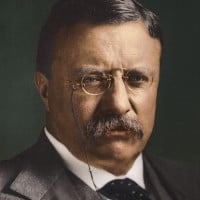 Theodore Roosevelt was an American statesman, author, explorer, soldier, naturalist, and reformer who served as the 26th President of the United States from 1901 to 1909. As a leader of the Republican Party during this time, he became a driving force for the Progressive Era in the United States in the... read more
Theodore Roosevelt was an American statesman, author, explorer, soldier, naturalist, and reformer who served as the 26th President of the United States from 1901 to 1909. As a leader of the Republican Party during this time, he became a driving force for the Progressive Era in the United States in the... read more Teddy was the first major trust buster in Presedential history. He also helped pass some of the nation's first consumer protection laws, which conservatives at the time claimed was government intrusion. When he later ran as a Progressive (Bull Moose), his platform included strict limitations on campaign contributions and the registration of lobbyists, national health insurance, social insurance (Social Security), expanding the minimum wage, establishing an eight hour workday, an inheritance tax, stronger unions, and so on.
 Abraham Lincoln (February 12, 1809 – April 15, 1865) was an American lawyer and statesman who served as the 16th president of the United States from 1861 until his assassination in 1865. Lincoln led the nation through the American Civil War and succeeded in preserving the Union, abolishing slavery,... read more
Abraham Lincoln (February 12, 1809 – April 15, 1865) was an American lawyer and statesman who served as the 16th president of the United States from 1861 until his assassination in 1865. Lincoln led the nation through the American Civil War and succeeded in preserving the Union, abolishing slavery,... read more Lincoln used Federal power to intervene in the matters of the states, which is usually controversial with conservatives. He also opposed the Mexican-American War, passed the Homestead Act, and passed the Morrill Act.
 Gerald Rudolph Ford Jr. was an American politician who served as the 38th President of the United States from August 1974 to January 1977.
Gerald Rudolph Ford Jr. was an American politician who served as the 38th President of the United States from August 1974 to January 1977. Ford is mainly known today for just being a placeholder President until Carter arrives. It's kind of sad, because Ford was pretty interesting and important. He helped establish special education throughout the US, he let the Vietnam War end, he admitted thousands of immigrants fleeing South Vietnam, he expanded anti-trust laws, he imposed more restrictions on campaign finance, he supported the Equal Rights Amendment, and he pardoned draft dodgers. Also, later in life, Ford opposed the Iraq War, and also admitted that he was pro-choice. He wouldn't make it in today's GOP.
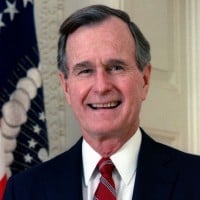 George Herbert Walker Bush (June 12, 1924 - November 30, 2018) was an American politician who served as the 41st President of the United States from 1989 to 1993. Prior to assuming the presidency, Bush served as the 43rd Vice President of the United States under Ronald Reagan from 1981 to 1989.
George Herbert Walker Bush (June 12, 1924 - November 30, 2018) was an American politician who served as the 41st President of the United States from 1989 to 1993. Prior to assuming the presidency, Bush served as the 43rd Vice President of the United States under Ronald Reagan from 1981 to 1989. Bush was much more moderate than his son. He, unlike his son, got UN authorization to go to war with Iraq, and only attacked after using every diplomatic option first. He also signed two civil rights bills, was a major supporter of the UN, passed a few pieces of environmental legislation, raised the minimum wage, raised taxes (gasp! ), and addressed that climate change was a major threat to human civilization.
 Dwight David "Ike" Eisenhower was an American politician and general who served as the 34th President of the United States from 1953 until 1961. He was a five-star general in the United States Army during World War II and served as Supreme Commander of the Allied Forces in Europe.
Dwight David "Ike" Eisenhower was an American politician and general who served as the 34th President of the United States from 1953 until 1961. He was a five-star general in the United States Army during World War II and served as Supreme Commander of the Allied Forces in Europe. Ike expanded Social Security and raised the minimum wage, oversaw very high marginal tax rates, desegregated public schools, opposed Israel's attack on Egypt, suspended the Korean War, signed two civil rights bills, and, most importantly, warned against the military-industrial complex. I guess most Republicans didn't get his memo.
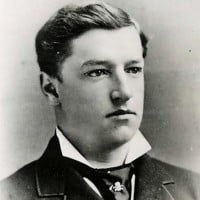 William Howard Taft served as the 27th President of the United States and as the tenth Chief Justice of the United States, the only person to have held both offices.
William Howard Taft served as the 27th President of the United States and as the tenth Chief Justice of the United States, the only person to have held both offices. Like Roosevelt, Taft was a strong trust-buster. He wasn't afraid to use federal power if it meant protecting the average American.
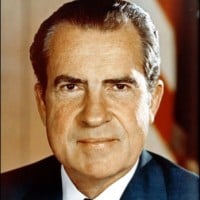 Richard Milhous Nixon was the 37th President of the United States from 1969 until his resignation in 1974, the only president to resign from office. He had previously served as the 36th Vice President of the United States from 1953 to 1961, and prior to that as a U.S. Representative and also Senator... read more
Richard Milhous Nixon was the 37th President of the United States from 1969 until his resignation in 1974, the only president to resign from office. He had previously served as the 36th Vice President of the United States from 1953 to 1961, and prior to that as a U.S. Representative and also Senator... read more Nixon is mainly known for Watergate, and for good reason. But people seem to forget that he had many accomplishments while President. He helped desegregate public schools, pass consumer protection laws, pass several pieces of environmental legislation, create the EPA and OSHA, lower the voting age, end the draft, raise the minimum wage, expand Social Security, etc. He also proposed a healthcare reform plan known as Nixoncare, which is basically the ACA on steroids. On top of it all, he proposed a guaranteed income, but was talked out of it by one of his more conservative advisors.
 Ulysses S. Grant was an American soldier and statesman who served as Commanding General of the Army and the 18th President of the United States, the highest positions in the military and the government of the United States.
Ulysses S. Grant was an American soldier and statesman who served as Commanding General of the Army and the 18th President of the United States, the highest positions in the military and the government of the United States. Grant, like Lincoln, used his powers to intervene in the affairs of the states during Reconstruction. He also was a supporter of women's suffrage, fought the KKK, passed a civil rights bill, and supported the right to an education.
 Herbert Clark Hoover was an American engineer, businessman and politician who served as the 31st President of the United States from 1929 to 1933 during the Great Depression.
Herbert Clark Hoover was an American engineer, businessman and politician who served as the 31st President of the United States from 1929 to 1933 during the Great Depression. Chester Alan Arthur was an American attorney and politician who served as the 21st President of the United States; he succeeded James A. Garfield upon the latter's assassination.
Chester Alan Arthur was an American attorney and politician who served as the 21st President of the United States; he succeeded James A. Garfield upon the latter's assassination. Arthur passed the Pendleton Act, supported civil rights, and lowered tariffs.
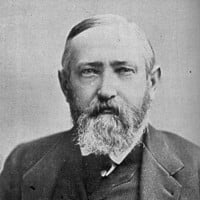 Benjamin Harrison was the 23rd President of the United States; he was the grandson of the ninth President, William Henry Harrison.
Benjamin Harrison was the 23rd President of the United States; he was the grandson of the ninth President, William Henry Harrison. Harrison passed anti-trust laws, opposed the spoils system, and expanded national parks.
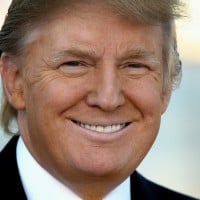 Donald John Trump (born June 14, 1946) is an American businessman, television personality, politician, and the 45th President of the United States. Born and raised in Queens, New York City, Donald J. Trump received an economics degree from the Wharton School of the University of Pennsylvania in 1968... read more
Donald John Trump (born June 14, 1946) is an American businessman, television personality, politician, and the 45th President of the United States. Born and raised in Queens, New York City, Donald J. Trump received an economics degree from the Wharton School of the University of Pennsylvania in 1968... read more
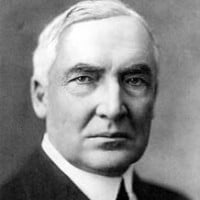 Warren Gamaliel Harding was the 29th President of the United States, serving from March 4, 1921 until his death in 1923.
Warren Gamaliel Harding was the 29th President of the United States, serving from March 4, 1921 until his death in 1923. Ronald Wilson Reagan (1911-2004) was an American politician and actor who was 40th President of the United States from 1981 to 1989 . Prior to his presidency, he was the 33rd Governor of California from 1967 to 1975, following a career as a Hollywood actor and union leader until his death in 2004
Ronald Wilson Reagan (1911-2004) was an American politician and actor who was 40th President of the United States from 1981 to 1989 . Prior to his presidency, he was the 33rd Governor of California from 1967 to 1975, following a career as a Hollywood actor and union leader until his death in 2004